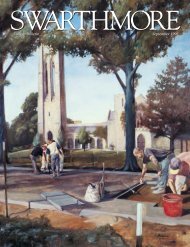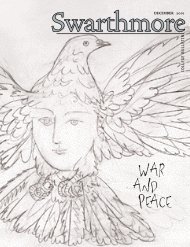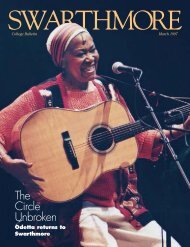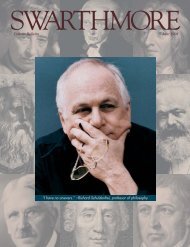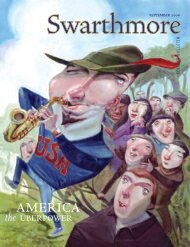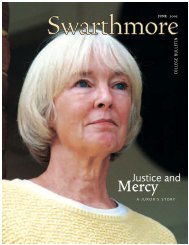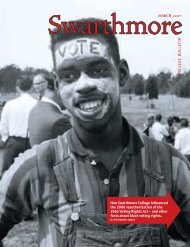TRUTH
Swarthmore College Bulletin (December 2006) - ITS
Swarthmore College Bulletin (December 2006) - ITS
- No tags were found...
You also want an ePaper? Increase the reach of your titles
YUMPU automatically turns print PDFs into web optimized ePapers that Google loves.
lettersHYSTERIA OR MERE MCGUILT?I wanted to thank Josef Joffe ’65 for “Americathe Ubiquitous” (Sept. Bulletin). He hasconvinced me that they (as in the rest ofthe world) don’t “hate us for our freedom”—it’sjust that they feel guilty aboutloving McDonald’s so much. NothingAmerica does can affect this relationship,so the only rational course is to proceedunilaterally.I also agree that it was perverse whenmillions of people around the worldprotested against our war of preemption.Pure hysteria. These America-haters couldn’tyet have known that the case for warwas based on lies.But imagine my surprise when I discoveredat the end of the article that this moderate,rational voice happens to be a fellowat the Hoover Institute. Could this beanother desperate attempt of the neoconservativesto regain their credibility afterthe disaster(s) that their brief but totalpolitical dominance has brought about?No, that’s probably just the anti-imperialistin me “find[ing] any proof that justifies[my] prejudice.”WILLIAM WANJOHI ’05Brooklyn, N.Y.CONSIDER THE SOURCEJosef Joffe’s insightful article “America theUbiquitous” describes a world fearful andenvious of—and repelled by—the UnitedStates, yet intensely desirous of Americanculture and artifacts. This disconnectresults from a failure to understand thesource of the Levis and McDonalds, of theWindows and Macs, of the jazz and lightbulbs, and of airplanes and televisions.These artifacts can—and indeed do—spread globally. But like the man fed a fishinstead of learning to fish, the continuedcreation of such cultural icons and the fantasticwealth they represent cannot occurin places where people are not politically,spiritually, and economically free. Unfortunately,this describes much of the world,including many of the regions exhibitinganti-Americanism.If, as Joffe writes, “Europe—indeed,most of the world—also wants what Americahas,” it should adopt the fundamentalthings America has: limited government,a bill of rights, the rule of law, sovereigntyof the people. Then, it can enjoy all of theepiphenomena that will result. Infantileenvy may be the psychological explanationof anti-Americanism, but it is still a puerilereflex.Like anti-Semitism and racism, anti-Americanism is an indictment of the hater,not of the object of his hate.STEVEN ADLER ’76SeattleTHE HUMAN FAMILYI was touched by Dahlia Wasfi’s [’93]account of her reactions to the Iraq wars(“For Now, They Struggle,” June 2006 Bulletin).I felt much sympathy with heranguish. I was dismayed to learn that therewas an outbreak of flag waving and prowaratmosphere on Swarthmore’s campusduring the 1990 Gulf War, when Wasfi wasa student. One would expect a morethoughtful and perceptive response. It isexasperating that the human family, towhich every one of us belongs, cannotlearn to resolve its differences nonviolently,and indeed, shows little interest in doingso. Why do we prefer to kill each other?JUDITH INSKEEP ’60White Plains, N.Y.THE ESSENCE OF SWARTHMOREIt was good to read that the current HonorsProgram at Swarthmore pleases manystudents. (“Life in Honors,” SeptemberBulletin). But what was described is a verydifferent experience from what I knew in1950–1952 as a student and again in thelate 1970s as a visiting honors examiner.The essence of Swarthmore blossomedfor me in its Honors Program, which wasthe College's unique contribution to Americanhigher education. President FrankAydelotte, who created it in 1924, thoughtof it as a way of breaking what he called theacademic lockstep. During our junior andsenior years, we studied in small seminars—inmy case, with between six andeight students each. Two seminars persemester was the norm. Although Aydelottehad modeled the program on the Oxfordtutorial system, he wisely prescribed seminarsinstead of individual tutorials. Theyhad room for individual expression anddevelopment, but within a framework ofcollaborative effort. We wrote and distributedpapers that formed the takeoff pointfor our discussions. If you managed youramericathe überpowerschedule carefully, you would write onepaper each week. I wrote more than 50such essays—all of which were analyzed bymy teachers and fellow students.The separation of grading from teachingwas essential to our Honors Program'ssuccess. Professors became our senior partners;we studied because we wanted tolearn, not to meet any external standard orteachers' expectations. That was the lockstepthat Aydelotte broke.In the 1980s, the Honors Program cameunder sharp criticism—in part because itwas not open to all students, but alsobecause some wanted options the programdid not include, such as the study-abroadadventure. I was invited to join a group offaculty members and alumni to evaluate theprogram. I was a stalwart defender ofmaintaining honors as it was, while gettingrid of its elitist taint by making it availableto all who wanted to enter it. This view wasrejected and honors was changed to sixseminars mixed with four graded courses. Ifeared this would lead to the eventual guttingof the system. It did. In 1996, Swarthmorehonors changed again. Seminars—which would be graded—were reduced tofour, mixed with four graded courses.These reforms effectively ended Aydelotte'sdream of breaking the academiclockstep. Swarthmore retains its high rankingamong liberal arts colleges—and westill send our annual contributions—butits distinguishing characteristic has beenfatally compromised. I sorely regret its lossand treasure even more my own Swarthmoreexperience.PAUL GASTON '52Charlottesville, Va.december 2006 : 3



